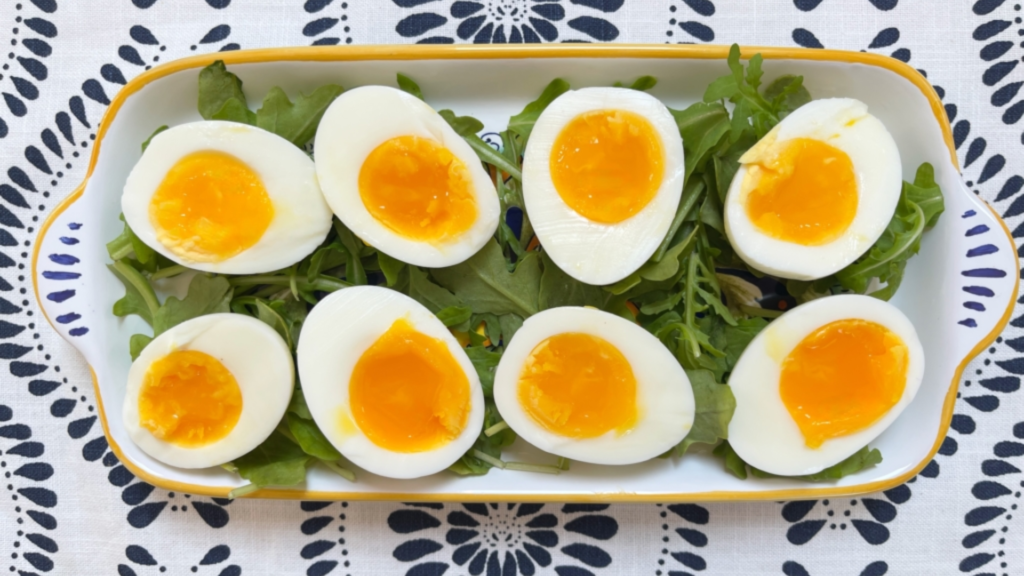Are Boiled Eggs Good for You? Here’s What You Need to Know
Boiled eggs are a staple in many diets, prized for being easy to prepare, affordable, and packed with nutrition. But are eggs actually good for you? Health experts say yes—when eaten in moderation and as part of a balanced diet, boiled eggs can offer a range of nutritional benefits without excess calories or harmful fats.
Let’s take a deep dive into the nutritional profile of eggs, how they impact cholesterol levels, and how often they can be safely included in your diet.

Nutritional Value: What’s Inside a Boiled Egg?
eggs are a rich source of high-quality protein, vitamins, and minerals. A single large boiled egg contains:
- Calories: 72
- Protein: 6.3 grams
- Fat: 5 grams (1.6 grams saturated)
- Carbohydrates: Less than 1 gram
- Cholesterol: 186–200 mg
According to USDA FoodData Central, eggs also contain:
- Vitamin A
- Vitamin D
- B vitamins (especially B12 and riboflavin)
- Folate
- Selenium
- Iron
- Choline (important for brain health)
Boiling doesn’t require oil or added fats, making eggs one of the healthiest ways to prepare this protein-rich food.
How Much Protein Do You Need Daily?
The amount of protein you need depends on your age, activity level, and weight. The Recommended Dietary Allowance (RDA) is:
- 0.8 grams per kilogram of body weight for the average adult
- 1.1 grams/kg for pregnant individuals
- 1.2 to 2.0 grams/kg for active individuals or those trying to build muscle
So, for example, someone who weighs 180 pounds (82 kg) should aim for 65 to 130 grams of protein daily, depending on activity levels.
eggs are an easy way to help meet this requirement. Two eggs provide about 12.6 grams of protein—almost 20% of an average adult’s daily needs.
Are Boiled Eggs Good for Weight Loss?
Yes, boiled eggs can be a great food for weight management. Here’s why:
- Low calorie: Just 72 calories per egg
- High satiety: Protein helps keep you full longer
- Low carb: Good for low-carb or ketogenic diets
- Portable: Easy to pack for meals or snacks
Including eggs in your breakfast may help reduce overall calorie intake throughout the day. Studies suggest high-protein breakfasts can reduce snacking and help control appetite.
Can I Eat Boiled Eggs Every Day?
For most healthy individuals, eating up to two or three boiled eggs a day is considered safe and beneficial. According to the 2020–2025 Dietary Guidelines for Americans, it’s important to consume a variety of protein sources, and eggs can be a nutritious part of that mix.
Registered dietitians suggest balancing your intake with:
- Lean meats and poultry
- Seafood
- Legumes and beans
- Nuts and seeds
- Plant-based proteins like tofu and lentils
The key is moderation and variety. Eating eggs every day is fine, but it’s important to mix in other protein-rich foods to ensure a well-rounded diet.
Are Boiled Eggs Bad for Cholesterol?
This is a common concern. While boiled eggs do contain dietary cholesterol, research increasingly shows that for most people, dietary cholesterol doesn’t significantly impact blood cholesterol levels.
A large boiled egg contains about 200 mg of cholesterol, mostly found in the yolk. The American Heart Association recommends that individuals with heart disease or high cholesterol limit dietary cholesterol—but not necessarily avoid eggs entirely.
According to a 2022 review in Nutrients, there is no consistent link between egg consumption and heart disease in healthy individuals. However, people with specific medical conditions should consult with their healthcare provider.
The greater concern may be saturated fat, which is more strongly linked to increased LDL (bad) cholesterol. Since boiled eggs contain just 1.6 grams of saturated fat, they’re a better choice than fried or scrambled eggs cooked with butter or oil.
Who Should Limit Egg Intake?
If you have one or more of the following conditions, you may want to moderate your egg consumption:
- High LDL cholesterol
- Family history of heart disease
- Type 2 diabetes
- Gallbladder issues
However, this doesn’t mean you must avoid boiled eggs entirely. If you’re following a diet low in saturated fat, including boiled eggs occasionally can still fit within a heart-healthy eating pattern.
Always talk to your healthcare provider or a registered dietitian about your individual needs.
How to Incorporate Boiled Eggs into a Healthy Diet
Here are some easy, healthy ways to enjoy boiled eggs:
- Breakfast: Add sliced eggs to whole grain toast or oatmeal
- Salads: Top a mixed green or grain-based salad with chopped boiled eggs
- Snacks: Eat a boiled egg with fruit or raw veggies
- Sandwiches: Make an egg salad using Greek yogurt instead of mayo
- Bento boxes: Pack as part of a balanced lunch with veggies, hummus, and nuts
Avoid adding too much salt or high-fat sauces, and aim for moderate portion sizes.
Boiled Eggs vs. Other Types of Eggs: Which Is Healthiest?
| Preparation | Calories | Fat | Added Oil? |
|---|---|---|---|
| Boiled | 72 | 5g | No |
| Scrambled | ~91 | 7g | Yes (if butter/oil used) |
| Fried | 90–120 | 8–10g | Yes |
| Poached | 72 | 5g | No |
Boiled and poached eggs are healthier options since they don’t require added fats during cooking. Fried eggs or omelets can be nutritious too—just be mindful of oil and cheese additions.
Final Verdict: Are Boiled Eggs Good for You?
Yes, boiled eggs are a healthy, nutrient-dense food when consumed as part of a varied, balanced diet. They provide high-quality protein, vitamins, and minerals with minimal calories and fat. For most people, two to three eggs per day is perfectly fine—especially when boiled instead of fried.
If you’re concerned about cholesterol or heart health, focus more on your overall dietary pattern rather than eliminating eggs entirely. Boiled eggs can play a valuable role in supporting your health goals, from muscle building to weight loss to brain support.




